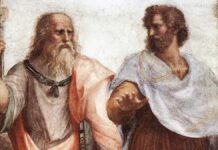Tragedy is a genre of literature and drama that explores human suffering, often culminating in a disastrous conclusion. Tragedies typically depict the downfall of a noble hero or protagonist, leading to a profound emotional response from the audience. These characters do so with a dignity that reveals the nature of the human spirit in the face of failure, defeat, and even death. In a tragedy, a protagonist is undone or brought to ruin by a critical character flaw or by the cruelty of fate. Literary tragedies recount a tragic hero’s downfall in that the protagonist typically begins in a “high” position or esteem and ends “low,” in despair, ruin, or destruction.
As a literary device, tragedy originated in ancient Greece with religious rituals and performances. Aristotle identified the elements of classical tragedy in his work Poetics, indicating that classical tragedy is the representation of a single action in which a hero of high status or prominence falls from fortune to misfortune because of his mistaken choice of action, to which he is led by his hamartia- his “error of judgement”, his tragic flaw. In classical tragedy, the tragic flaw that causes the character’s fall must be a misjudgment or shortcoming in the hero, not a vice or impurity. Aristotle also stipulated that the purpose of tragedy is to evoke fear and sympathy due to the hero’s fall, leading to catharsis or a healthy emotional purge for the audience.
“Tragedy, then, is an imitation of an action that is serious, complete, and of a certain magnitude; in the language embellished with each kind of artistic ornament, the several kinds being found in separate parts of the play; in the form of action, not of narrative; through pity and fear effecting the proper purgation-catharsis of these and similar emotions.”
Aristotle argued that tragedies give us a feeling of catharsis or the release of pent-up emotions. As we go through life, we store negative emotions, ‘bottling them up’, as we might say now. Aristotle believed a good tragedy was a productive, safe way to release those negative emotions. A tragic hero can have all kinds of flaws. But the most common is hubris, a Greek term meaning an excess of confidence, ambition, or defiance toward the gods. Once you learn to recognise hubris, you’ll see it everywhere in literature and real life. William Shakespeare helped revive the Greek tradition of tragic heroes brought down by their flaws. However, Shakespeare revolutionised the literary device of tragedy by creating more ‘ordinary’ tragic heroes and protagonists and enhancing their tragic stories with exciting subplots and additional characters. The well-known Shakespearean tragedies are Hamlet, Macbeth and King Lear. As a literary device, tragedy has evolved from classic Greek literature into modern literary works in which the tragic hero is more of a ‘common man’ with complex flaws and vices, making it more relatable to the contemporary audience.
In any tragedy, we start with the tragic hero, usually in his prime. The hero is successful, respected, and happy. However, he has some tragic flaws that will ultimately cause his downfall. Usually, the story’s plot follows a gradual descent from greatness to destruction. The hero must end up isolated from all of his friends and companions. In the end, we feel deep sadness and pity (also called pathos) for the hero. But we also feel a sense of understanding – the story warns us to guard against the ordinary flaws that brought down the hero, thereby serving as a cautionary tale. One of the most famous classical tragedies is Oedipus Rex. This Greek drama by Sophocles presents the dramatic story of Oedipus, who unknowingly kills his father and marries his mother. Oedipus Rex meets all the criteria for tragedy as a literary device. Oedipus is considered admirable due to his noble birth. His tragic flaw is his pride, demonstrated by denying the gods’ will and attempting to change his destiny by fleeing Corinth. Oedipus’s continued pride and refusal to acknowledge the truth of his circumstances until it is too late leads to his downfall and remorse. Oedipus blinds and exiles himself.
Characteristics
Noble Protagonist
- The central character is often of noble birth or high status, possessing admirable qualities but also a tragic flaw (hamartia) that leads to their downfall.
- The protagonist’s journey evokes pity and fear, engaging the audience emotionally.
Tragic Flaw (Hamartia)
- A defect or error in the protagonist’s character that contributes to their downfall.
- Common tragic flaws include hubris (excessive pride), ambition, jealousy, and rashness.
Catharsis
- The process by which the audience experiences a purging of emotions, particularly pity and fear.
- Aristotle introduced this concept, suggesting tragedy allows the audience to confront and process deep emotions.
Inevitable Downfall
- The protagonist’s downfall is often unavoidable, driven by fate, destiny, or the character’s own choices and actions.
- The outcome is typically catastrophic, involving death, destruction, or profound loss.
Moral and Philosophical Themes
- Tragedy often explores complex moral and philosophical questions, such as the nature of justice, the role of fate, and the consequences of human actions.
- These themes encourage introspection and contemplation.
Elements
Plot
- The plot of a tragedy is often complex, involving twists, turns, and moments of recognition (anagnorisis) and reversal of fortune (peripeteia).
- The narrative builds toward a climax that results in the protagonist’s downfall.
Character
- The tragic hero is central to the story, with a character arc that involves a rise to greatness followed by a fall from grace.
- Supporting characters often reflect or contrast with the protagonist, highlighting key themes and conflicts.
Theme
- Tragedies explore profound and often universal themes, such as the inevitability of fate, the consequences of hubris, and the struggle between good and evil.
- These themes resonate deeply with audiences, provoking thought and emotional engagement.
Language
- The language of tragedy is often elevated and poetic, using metaphor, imagery, and rhetorical devices to convey the gravity of the subject matter.
- Dialogue and monologues are crafted to express complex emotions and philosophical ideas.
Spectacle
- Spectacle plays a significant role in classical and Elizabethan tragedy, with dramatic actions, settings, and effects enhancing the emotional impact.
- Modern tragedies may use more subtle forms of spectacle, focusing on psychological and social realism.
Types of Tragedy
Classical Tragedy
Adheres to the principles outlined by Aristotle, including unity of time, place, and action, and the presence of a tragic hero with a fatal flaw.
E.g., Oedipus Rex by Sophocles.
Elizabethan Tragedy
Incorporates complex plots, subplots, and a mixture of prose and verse.
Often includes supernatural elements and explores themes of ambition, revenge, and moral corruption.
E.g., Hamlet by William Shakespeare.
Revenge Tragedy
Centers on a protagonist seeking vengeance for a wrong or injustice, often leading to a cycle of violence and retribution.
E.g., The Spanish Tragedy by Thomas Kyd.
Modern Tragedy
Focuses on the lives of ordinary people and the tragedies of contemporary society and often addresses themes such as existential despair, social injustice, and the human condition.
E.g., Death of a Salesman by Arthur Miller.
Tragedy vs. Comedy
As literary devices, tragedy and comedy are opposites, there are significant differences between them; however, they are not directly opposed to each other. In terms of plot, the events in a comic work do not have a sense of inevitability. Instead, the resolution of a comedy is typically festive once characters realise their genuine connection to each other. Tragic plots stem from suffering and result in dark and dramatic reflections. In terms of audience and reader experience, comedy evokes laughter as a shared experience and a sense of human likeness. Tragedy often evokes suffering and estrangement. However, this is not to say that the audience does not identify with a tragic hero. Most tragic protagonists are complex, engendering respect and compassion for their falls and defeats. Traditionally, comic protagonists are not as full-fledged and remain emotionally distant from the audience. Though classical tragedies often end in oppressive circumstances of fate or fortune, writers of modern tragedy typically focus on the constraints and conventions of society. This, combined with the protagonist’s tragic flaw, generally causes the adverse outcome or “fall” of a modern tragic hero.
Tragedy is a powerful and enduring genre that delves into the depths of human experience, exploring themes of suffering, fate, and the consequences of human actions. Through its complex characters, profound themes, and cathartic effects, tragedy offers a profound and moving reflection on the human condition. Whether through the downfall of a noble hero or the struggles of ordinary individuals, the tragedy continues to resonate with audiences, providing both emotional engagement and intellectual insight.






























